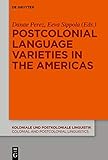Postcolonial Language Varieties in the Americas / ed. by Danae Maria Perez, Eeva Sippola.
Material type: TextSeries: Koloniale und Postkoloniale Linguistik / Colonial and Postcolonial Linguistics (KPL/CPL) ; 18Publisher: Berlin ; Boston : De Gruyter, [2021]Copyright date: ©2021Description: 1 online resource (VIII, 326 p.)Content type:
TextSeries: Koloniale und Postkoloniale Linguistik / Colonial and Postcolonial Linguistics (KPL/CPL) ; 18Publisher: Berlin ; Boston : De Gruyter, [2021]Copyright date: ©2021Description: 1 online resource (VIII, 326 p.)Content type: - 9783110723908
- 9783110724035
- 9783110723977
- 306.44097 23
- P130.52.A45 P67 2021
- P130.52.A45 P67 2021eb
- online - DeGruyter
- Issued also in print.
| Item type | Current library | Call number | URL | Status | Notes | Barcode | |
|---|---|---|---|---|---|---|---|
 eBook
eBook
|
Biblioteca "Angelicum" Pont. Univ. S.Tommaso d'Aquino Nuvola online | online - DeGruyter (Browse shelf(Opens below)) | Online access | Not for loan (Accesso limitato) | Accesso per gli utenti autorizzati / Access for authorized users | (dgr)9783110723977 |
Frontmatter -- Contents -- Preface -- Colonialism and new language varieties in the Americas: An introduction -- Pero – Champion of Hispanization? -- A Mesoamerican perspective on contactinduced change in numeral classification -- Secondary derivation in the Michif verb: Beyond the traditional Algonquian template -- Social conditioning for the transmission of adstrate features in contact varieties of Spanish in the Central Andes -- The Afro-Brazilian community Kalunga: Linguistic and sociohistorical perspectives -- Hispanicization in the Welsh settlement of Chubut Province, Argentina -- Complex patterns of variety perception in the Eastern Caribbean -- The contested role of colonial language ideologies in multilingual Belize -- Index of Authors -- Index of Languages -- Index of Subjects
restricted access online access with authorization star
http://purl.org/coar/access_right/c_16ec
In the Americas, both indigenous and postcolonial languages today bear witness of massive changes that have taken place since the colonial era. However, a unified approach to languages from different colonial areas is still missing.The present volume studies postcolonial varieties that emerged due to changing linguistic and sociolinguistic conditions in different settings across the Americas. The studies cover indigenous languages that are undergoing lexical and grammatical change due to the presence of colonial languages and the emergence of new dialects and creoles due to contact. The contributions showcase the diversity of approaches to tackle fundamental questions regarding the processes triggered by language contact as well as the wide range of outcomes contact has had in postcolonial settings.The volume adds to the documentation of the linguistic properties of postcolonial language varieties in a socio-historically informed framework. It explores the complex dynamics of extra-linguistic factors that brought about the processes of language change in them and contributes to a better understanding of the determinant factors that lead to the emergence and evolution of such codes.
Issued also in print.
Mode of access: Internet via World Wide Web.
In English.
Description based on online resource; title from PDF title page (publisher's Web site, viewed 25. Jun 2024)


